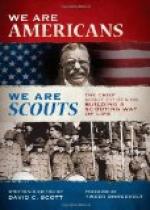That particular spot is no exception, for every place I have visited in late years all through the western country has met with the same change, and the places that I was familiar with in my youth are strange to me now.
The place that is now called the city of Denver I will take for an example. At the time I am speaking of, the year of forty-eight, and for several years later, it was one of the greatest Antelope countries in all the west, and I think I am safe in saying that there were not fifty white men in all what is now called the state of Colorado.
I visited several cities in that state a year ago, and it would be difficult for the people of this time to understand the feeling of surprise that I experienced when I saw what civilization had done to every place I visited.
On the Platte river in the eastern part of the city of Denver where the large machine shops now stand is the spot where the largest bands of Antelope were to be found, and it was there that we used to go to get them every morning as they came down to the river to drink.
From the site where Amarillo is now we had all the Buffalo meat we wanted, and when we struck what is now the city of Trinidad, Colorado, we followed the stream known as and called the “Picket Wire,” down to the Arkansas river, and as we were in the heart of the Buffalo country, we were not out of the sight of herds of Buffalo all the way down to that river.
It would be an impossibility to make this generation understand the numbers of herds that roamed the western country. While the Buffalo was the most numerous game of the plains, they were the most strange in their habits. They made the round trip from Texas to the head of the Missouri river in Dakota and back again every year. As soon as they reached one end of their journey, they invariably turned around and began their journey back. Another peculiarity of this animal was that the calves never followed their mother, but always preceded her, and in case of fright, or when she thought them in danger when the herd started on the run, if the calves could not keep up with the others the mother would push her calf forward with her nose.
I think I have seen a mother Buffalo throw her calf at least ten feet in one push, and it would always alight on its feet and not break its run.
When we reached Bent’s Fort, Capt. McKee asked Col. Bent how the gold mines were on Cherry creek. The Col. laughed and said, he had not heard from them in about three months, and the last news he had from there were that Cherry creek was deserted, so by that he thought the amount of gold there must be rather limited, and then Capt. McKee told him that he had fitted up a company and had come all the way from Texas to dig gold from Cherry creek.
Col. Bent said, “Well, Capt., there has been another discovery made on what is called Russel’s gulch which is a tributary of Clear creek, and I have no doubt but there is gold to be found there.”




